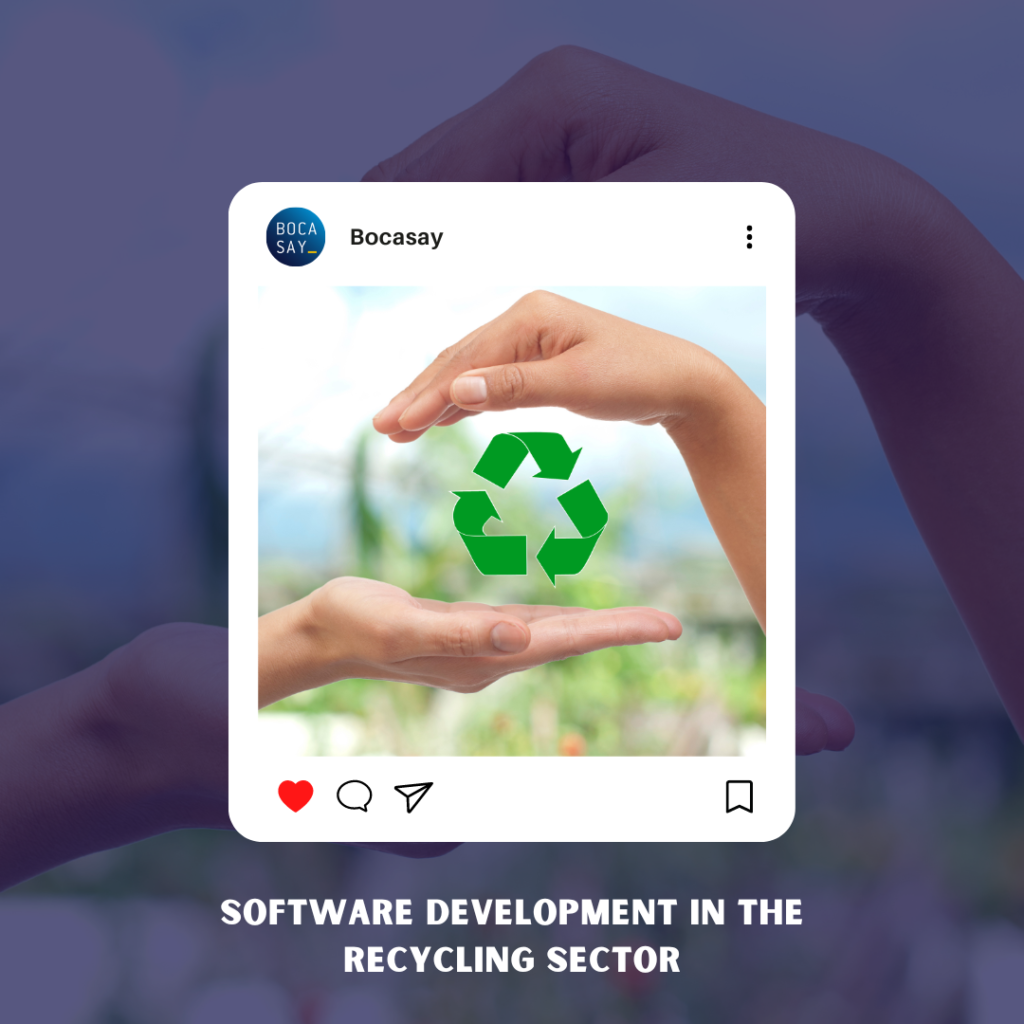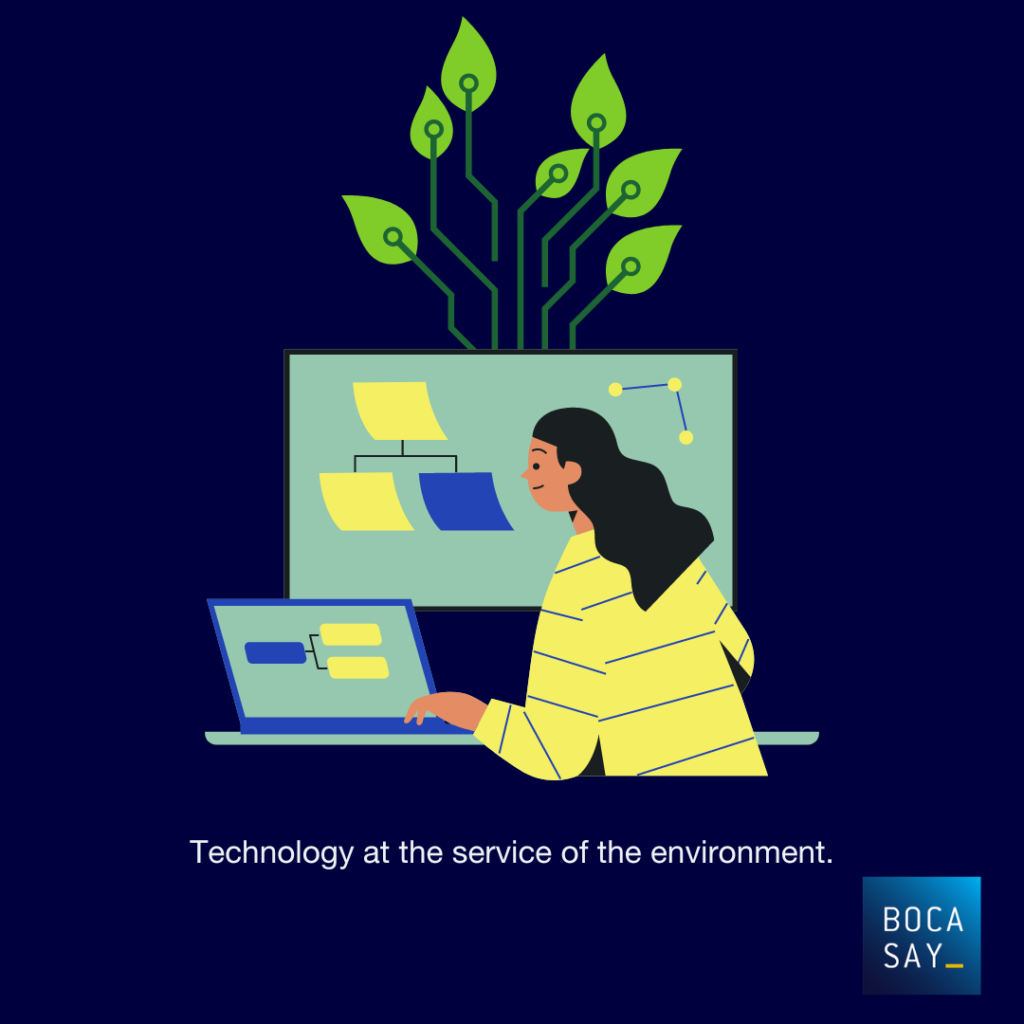Software Development in the Recycling Sector
Waste management is one of the most innovative fields in the world. With a waste disposal market characterized by constant evolution, key players within the recycling sector require advanced software solutions that meet the industry’s needs and challenges, fast becoming more and more important in the fight against global warming.
In this article, Bocasay, an offshore outsourcing company, examines the importance of development in the recycling sector and why it is useful.

Why is software important in the recycling industry?
Improved Efficiency
Waste management, supply chain tracking and process simulation software help optimize recycling operations, resulting in improved efficiency and reduced costs.
Increase Recycling Rates
Online recycling platforms help connect waste providers and recyclers, maximizing recycling rates and reducing waste.
Information Management
Software helps collect, store and analyze data on recycling operations, which can help companies make informed decisions and improve performance.
Environmental Footprint Reduction
Waste management and supply chain tracking software helps minimize waste and maximize material recovery, which helps reduce the environmental footprint.
Regulatory Compliance Management
Software helps monitor and comply with recycling regulations, which can help companies avoid penalties and fines.
𝕎𝕒𝕟𝕥 𝕥𝕠 𝕘𝕣𝕠𝕨 𝕪𝕠𝕦𝕣 𝕓𝕦𝕤𝕚𝕟𝕖𝕤𝕤 𝕠𝕟𝕝𝕚𝕟𝕖 𝕓𝕦𝕥 𝕕𝕠𝕟’𝕥 𝕜𝕟𝕠𝕨 𝕙𝕠𝕨 𝕥𝕠 𝕘𝕠 𝕒𝕓𝕠𝕦𝕥 𝕚𝕥? 𝔹𝕠𝕔𝕒𝕤𝕒𝕪, 𝕒𝕟 𝕠𝕗𝕗𝕤𝕙𝕠𝕣𝕖 𝕠𝕦𝕥𝕤𝕠𝕦𝕣𝕔𝕚𝕟𝕘 𝕔𝕠𝕞𝕡𝕒𝕟𝕪, 𝕡𝕣𝕠𝕧𝕚𝕕𝕖𝕤 𝕪𝕠𝕦 𝕨𝕚𝕥𝕙 𝕚𝕥𝕤 𝕖𝕩𝕡𝕖𝕣𝕥𝕤 𝕥𝕠 𝕒𝕔𝕔𝕠𝕞𝕡𝕒𝕟𝕪 𝕪𝕠𝕦 𝕚𝕟 𝕪𝕠𝕦𝕣 𝕕𝕚𝕘𝕚𝕥𝕒𝕝 𝕕𝕖𝕧𝕖𝕝𝕠𝕡𝕞𝕖𝕟𝕥. ℂ𝕣𝕖𝕒𝕥𝕚𝕠𝕟 𝕠𝕗 𝕨𝕖𝕓𝕤𝕚𝕥𝕖, 𝕞𝕠𝕓𝕚𝕝𝕖 𝕒𝕡𝕡𝕝𝕚𝕔𝕒𝕥𝕚𝕠𝕟, 𝕤𝕠𝕗𝕥𝕨𝕒𝕣𝕖, 𝕠𝕦𝕣 𝕔𝕠𝕝𝕝𝕒𝕓𝕠𝕣𝕒𝕥𝕠𝕣𝕤 𝕒𝕣𝕖 𝕒𝕥 𝕪𝕠𝕦𝕣 𝕕𝕚𝕤𝕡𝕠𝕤𝕒𝕝 𝕥𝕠 𝕙𝕖𝕝𝕡 𝕪𝕠𝕦 𝕕𝕖𝕧𝕖𝕝𝕠𝕡 𝕋ℍ𝔼 𝕤𝕠𝕝𝕦𝕥𝕚𝕠𝕟 𝕥𝕙𝕒𝕥 𝕨𝕚𝕝𝕝 𝕒𝕝𝕝𝕠𝕨 𝕪𝕠𝕦 𝕥𝕠 𝕣𝕖𝕒𝕔𝕙 𝕐𝕆𝕌ℝ 𝕘𝕠𝕒𝕝𝕤! ℂ𝕠𝕟𝕥𝕒𝕔𝕥 𝕦𝕤 𝕥𝕠𝕕𝕒𝕪!
Types of Software in the Recycling Industry
Software development in the recycling industry can help improve the efficiency of recycling operations and reduce waste. Here are some examples:
Waste Management Software
Waste management software helps companies manage their waste efficiently, tracking its life cycle from collection to final processing.
👉 Features may include:
- Collection scheduling.
- Waste inventory management.
- Cost and performance tracking.
- Report generation to help make informed decisions.
Online Recycling Platform
An online recycling platform facilitates connections between waste providers and recyclers, maximizing recycling rates.
👉 Features may include:
- Bid and request management.
- Transportation cost estimation.
- Performance monitoring.
- Report generation.
Supply-Chain Tracking Software
Supply chain tracking software can help track recyclable materials throughout the recycling process, from collection to processing into finished products.
👉 Features can include:
- Material traceability.
- Inventory management.
- Production planning.
- Performance reporting.
Demand Forecasting Software
Demand forecasting software can help recycling companies plan their operations based on market trends and fluctuations in raw material prices.
👉 Features can include:
- Market data analysis.
- Demand forecasting.
- Raw material purchase planning.
- Performance reporting.
Process Simulation Software
Process simulation software can help optimize recycling operations by modeling material flows, processing times and associated costs.
👉 Features can include:
- Process design.
- Scenario simulation.
- Profitability analysis.
- Performance reporting.

Examples of Software in the Recycling Sector
Waste Management System (WMS)
This is a waste management software that tracks waste throughout its life cycle, from collection to final processing. The software helps plan collections, track waste inventories, calculate processing costs and generate performance reports.
Recy Systems
This online recycling platform connects waste suppliers and recyclers to maximize the recycling rate. The platform manages offers and requests, estimates transportation costs and monitors performance.
T2e3
This supply chain tracking software helps track recyclable materials throughout the recycling process, from collection to transformation into finished products. The software tracks materials, manages inventory, schedules production and generates performance reports.
Re-TRAC Connect
This waste management software focuses on waste prevention and improved sustainability. It can track waste streams, monitor sustainability goals and generate performance reports.
SimaPro
This is a process simulation software that helps optimize recycling operations by modeling material flows, processing times and associated costs. The software allows for process design, scenario simulation, cost effectiveness analysis and performance reporting.
Tips for Making your Business more Green
Even though innovation and technology allow our society to limit its negative impact on the environment, adopting a greener approach within your company is necessary. To do so, here are some simple habits you can easily implement:
Assess the company’s carbon footprint 👣
To understand the environmental impact of your business, it is important to conduct a carbon footprint assessment. This assessment helps identify sources of greenhouse gases and determine areas that need special attention.
Reduce energy consumption ⚡
Reducing energy consumption is an effective way to reduce your company’s environmental impact. This can be achieved by using renewable energy sources, implementing energy efficiency practices, investing in energy efficient equipment, etc.
Reduce waste 🚮
Waste has a significant environmental impact. To reduce waste, you can implement recycling programs, use sustainable and biodegradable materials, limit the use of disposable products, etc.
Encourage Sustainable Transportation 🚲
Transportation is a major source of air pollution and greenhouse gases. You can encourage sustainable transportation by offering alternatives such as carpooling, biking, walking, telecommuting, etc.
Use Green Technologies 🪴
Green technologies such as renewable energy, waste management systems, energy efficient equipment, etc. can help reduce your company’s environmental impact.
Work with Sustainable Suppliers ♻️
Suppliers can have a significant environmental impact. It is important to work with suppliers who have sustainable practices and who take into account the environmental impact of their business operations.


